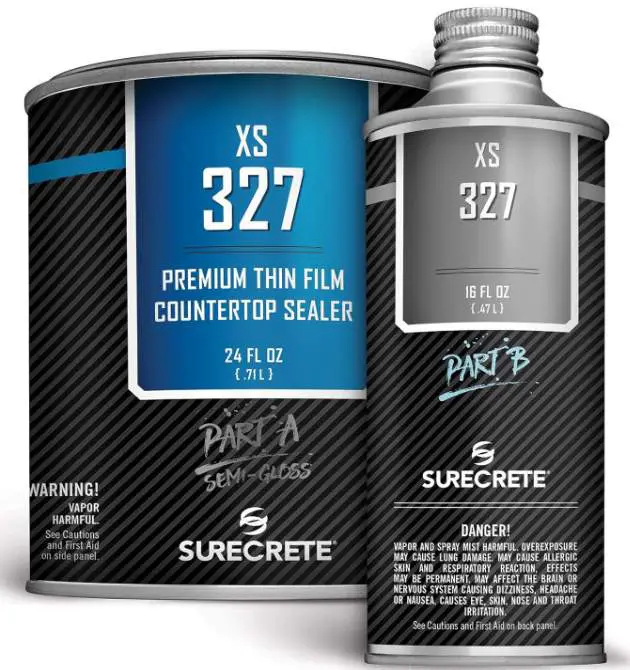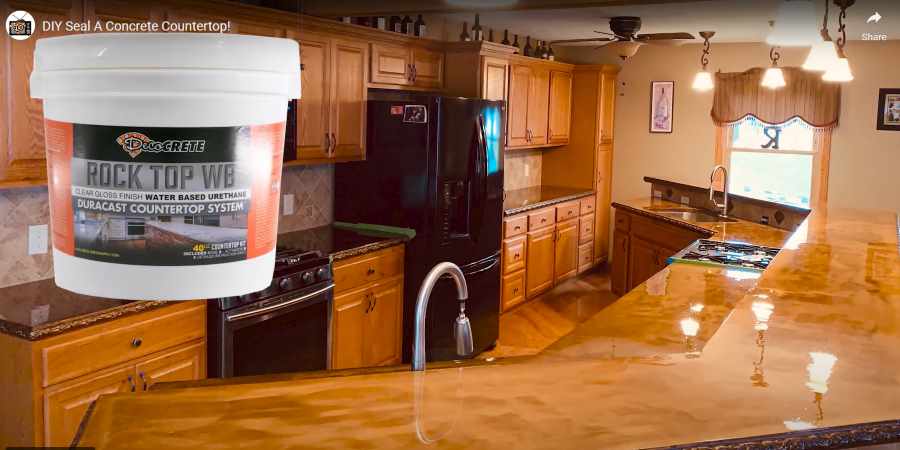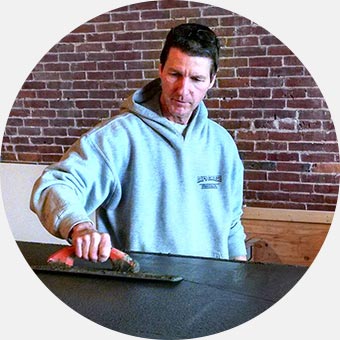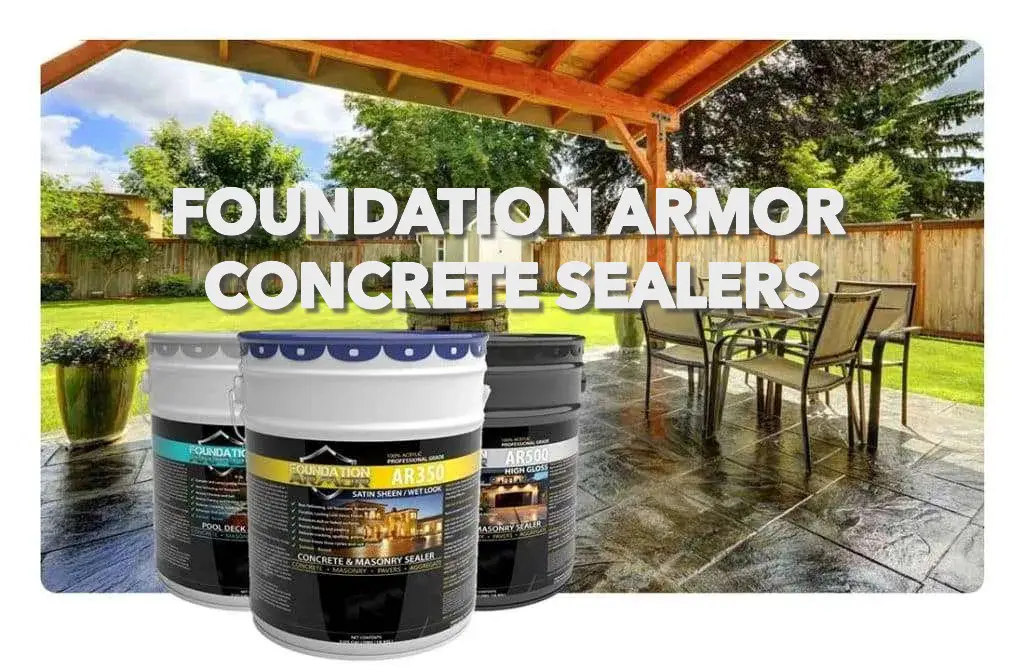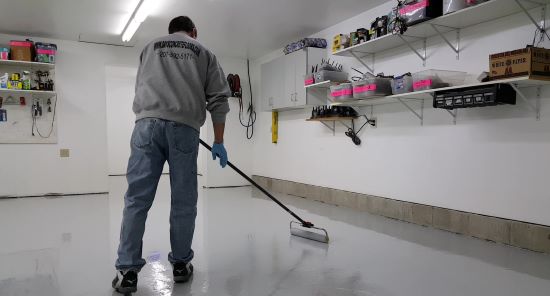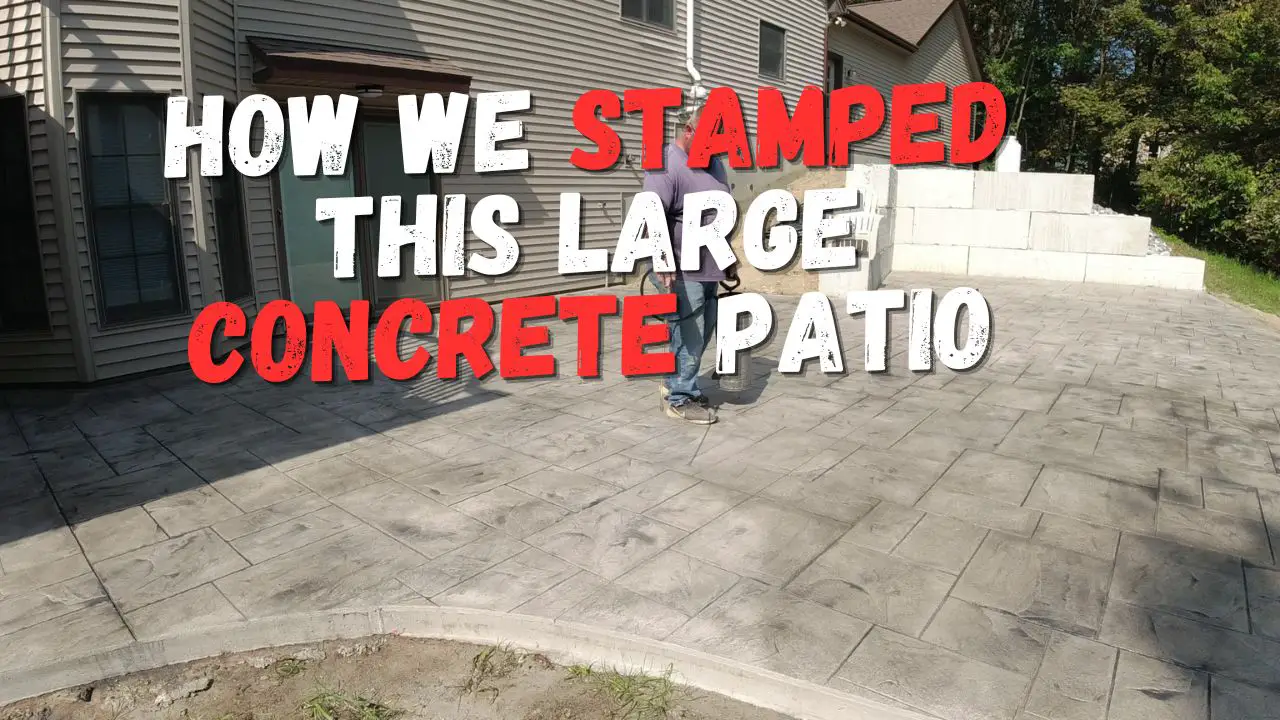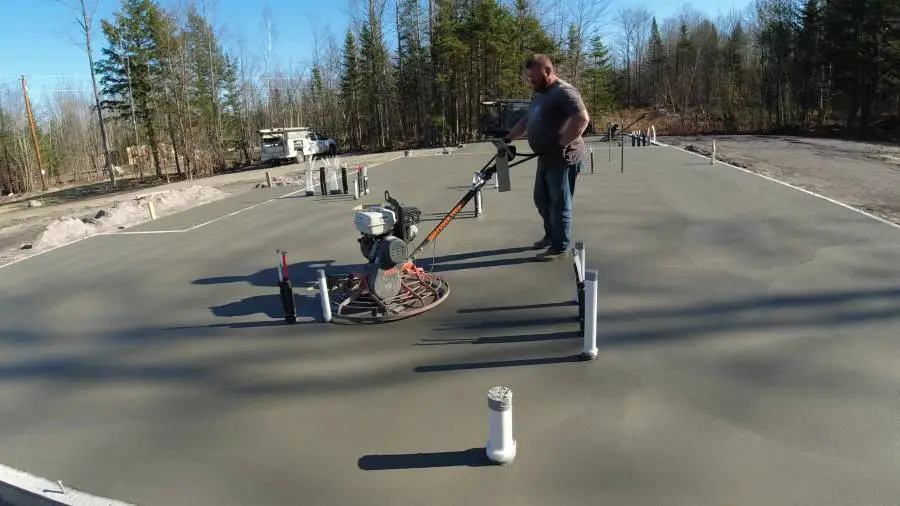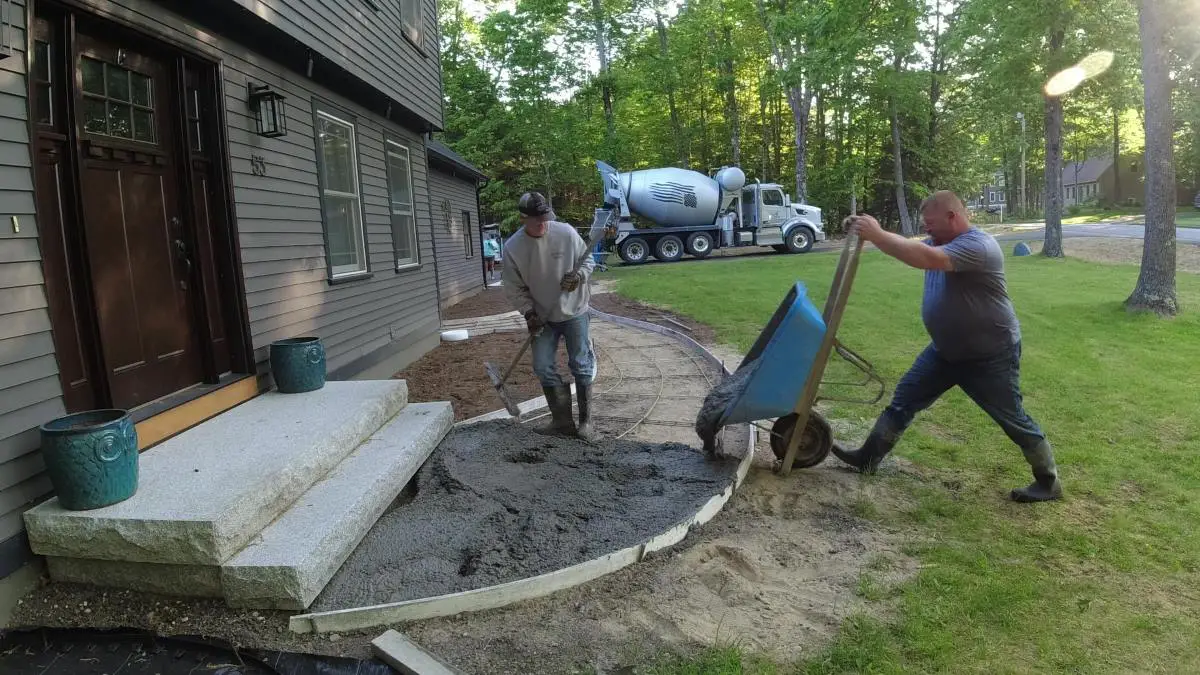What is the best sealer for concrete countertops?
Updated November 15, 2023
Author: Michael Day
Sealers for concrete countertops have improved a lot over the years.
With the right sealer you can construct a countertop that provides many of the important functions you want in the kitchen:
- Stain-resistant
- Heat-resistant
- Scratch-resistant
- Food safe
- Easy to clean
- Easy to maintain
- Smooth as glass
THE BEST SEALER FOR CONCRETE COUNTERTOPS
Un-sealed concrete is porous and susceptible to staining and chemical attack.
Liquids will soak into the surface and stain the concrete.
Acidic foods like lemon juice, lime juice, and vinegar will dissolve the cement paste and etch the surface.
The "best" sealer for concrete countertops must meet some basic principles that are important to both the potential owners and the contractor making the countertop.
FACTORS THAT ARE IMPORTANT TO POTENTIAL OWNERS
- Enhance the appearance without changing the look or feel of the concrete
- Non-porous
- Completely resist stains from food, oils, and liquids
- Resist etching from acidic foods like lemons and vinegar
- Resist heat from hot pots and pans
- Doesn't turn yellow from sunlight
- Doesn't scratch easily
- Is food safe
- Cleans easily using common household cleaners
- Very little maintenance with long term protection
- Won't peel, flake, chip or blister
- Easily repaired
WHAT'S IMPORTANT TO THE CONTRACTOR
- Sealer isn't too expensive
- It's quick and easy to apply
- Satisfies the customer
So, incase you haven't figured it out already, there is no "Best" one size fits all sealer for concrete countertops.
There are advantages and disadvantages to each kind. The important thing is to choose one that's best for both the owners and the contractor.
THE DIFFERENT TYPES OF SEALERS
There's a lot of different sealers you can use that offer varying degrees of protection. There's no "perfect" sealer and none of them meet all the
factors stated above, although some come close.
Concrete countertop sealers fall into two basic catagories: penetrating sealers and topical sealers.
Both of them have their advantages and some drawbacks. Choosing the right one is a matter of weighing the pros and cons of the environment the countertop will be installed in.
PENETRATING COUNTERTOP SEALERS
The basic qualities of a penetrating concrete countertop sealer are:
- Penetrating sealers soak into the concrete
- When dry are invisible
- Usually Doesn't affect the appearance
- Will decrease porosity
- Will increase surface hardness
- Leaves no film on the surface
DENSIFIERS AND HARDENERS
These types of sealers are unique, here's what they do
- Chemically react with the cement paste
- Increases the strength of the surface
- Fills the pores to decrease porosity
- May provide some color enhancement
There are three types of densifiers:
- Sodium silicates - most common and least expensive
- Potassium silicates
- Lithium silicates - more expensive but more reactive and better than sodium silicates
REPELLANT SEALERS
The three common types of repellant sealers are siloxanes, silanes, and fluoropolymers.
Repellant sealers change the surface tension properties of concrete so liquids bead up and are easily wiped off.
Siloxanes and silanes are both silicone based materials that penetrate deeply into the concrete. They don't leave a film on the surface so there's no change in appearance, (color or sheen).
Fluoropolymers are a different form of repellant sealer. They can enhance the color a bit or be invisible. Some leave a slight film on the surface
of the concrete (like a coating) in addition to being a repellant.
Repellant sealers are very abrasion resistant because they become part of the concrete structure, they're also heat resistant and UV resistant.
WHAT YOU SHOULD KNOW ABOUT PENETRATING SEALERS
- Don't leave a film on the surface
- Do keep liquids from soaking into the concrete
- Don't provide long term protection to harsh staining foods like wine, mustard and oils
- Don't provide great protection against acidic foods like lemons and vinegar
- Does provide good protection for less harsh environments (coffee tables, fireplace mantles, and hearths)
- Don't flake or peel off
- Don't need to be reapplied at all or for many years
- Not affected by heat or sunlight
Once a penetrating sealer is applied to a concrete countertop, no other sealers can be applied, except wax, without risking them peeling off.
If the concrete is polished over a #200 grit, penetrating sealers are usually the best choice.
Very smooth finishes don't allow for a good bond with topical sealers. Usually a densifier is used during polishing and then a repellent sealer is
applied as the finish coat.
TOPICAL SEALERS FOR CONCRETE COUNTERTOPS
Topical sealers provide a coating on the surface of the concrete. There's a wide range of topical countertop sealers available with varying degrees of appearance and protection.
USING JUST WAX FOR SEALING
Wax is as basic as sealers come. Depending on how much is used, wax can be both penetrating and film forming.
Usually a high quality floor wax that contains carnauba and bees wax or just pure bees wax is used. Automotive paste wax should never be used on concrete countertops.
Wax will darken bare concrete and bring out the color while producing a low to high sheen finish.
Wax is easy to apply and reapply and must be applied frequently to be effective.
It's not a very good performing sealer, most anything will leave a mark or stain on waxed concrete if left on long enough.
Hot pans can cause the wax to soften or melt.
Lemon juice and vinegar will strip off the wax and etch the surface of the concrete.
Sometimes wax is applied over other sealers but, all in all, it doesn't really provide much extra protection.
USING ACRYLIC SEALERS ON COUNTERTOPS
Acrylic sealers are either solvent based or water based and are a one-component type of sealer. These are mostly used on exterior concrete flatwork and concrete floors.
The solvent based acrylic sealers come clear or can be pigmented with most any color you want. Both water and solvent based versions are UV resistant, fairly easy to apply, and inexpensive compared to epoxies and urethanes.
Solvent based acrylics will darken the concrete and leave a glossy sheen on the surface. Water based acrylics don't darken the concrete nearly as much and leave the concrete looking similar to what it looks like without any sealer.
Acrylic sealers are applied very thin either by brush, roller, or sprayed on. On a hard, dense surface like a countertop the sealer just sits on the surface.
They offer fairly good stain protection but scratch easily and require reapplication quite often. Acrylic sealers only offer modest heat protection.
EPOXY SEALERS FOR COUNTERTOPS
Most epoxies used to seal countertops are very similar. They are two component liquids consisting of a resin and a hardner that chemically react when mixed together. They give you a very hard and durable surface that provides very good stain protection.
There's three basic types: solvent based, water based, and 100% solids. Epoxies that are 100% solids have no solvent or thinner in them meaning all the material that's mixed together reacts to form the coating.
Most epoxies will yellow when exposed to direct sunlight and start to chemically breakdown unless a UV inhibitor or pigment is used.
Epoxies, when dry are very hard and usually quite glossy. Because they're so hard they tend to scratch and scuff easily. They also leave the
appearance of a plastic looking coating on the surface of the countertop.
Applying epoxies is more difficult than acrylics. They must be mixed accurately, applied quickly, and are sensitive to moisture. If any moisture is still in the concrete, bubbles can occur resulting in peeling.
HOW ABOUT USING URETHANES
Urethane sealers for concrete countertops have many of the factors you want in a sealer. There are single component and two component urethanes, water based and solvent based ones.
Urethanes are very stain, chemical, and heat resistant. They provide excellent UV resistant and leave you a tough, durable, scratch resistant finish.
Some versions of urethane sealers can bond right to the concrete and some bond better to an epoxy primer.
The surface they are applied to must be properly prepared making them a little tricky to apply. If they're not mixed correctly and applied properly, they could peel.
Urethanes tend not to want to stick to themselves making them harder to repair, and they're fairly expensive.
PREPARING THE SURFACE IS MOST IMPORTANT
Clean, dry, and dust free, successful sealing always begins with good surface prep. Bare concrete countertops always have to be cleaned before sealing them.
The sealer manufacturer has instructions on the label, always follow them don't take shortcuts.
Hardeners and densifiers react with the alkaline structure in concrete, so don't acid wash if using these, only use clean water.
Topical sealers like a neutral surface, not highly alkaline or acidic. To get a neutral surface, use about 1/4 cup muriatic acid mixed with 1 gallon of water. You can use vinegar instead of acid if you like.
Always wear rubber gloves! Just wipe the surface clean, you don't need
to let the solution sit on the surface.
Always neutralize the acid after cleaning with it.
Mix 1 cup ammonia with 1 gallon of water and rinse off the surface immediately after washing with the acid solution. The ammonia/water solution will kill the acid and you can then rinse the surface with clean water multiple times so no residue remains.
Wipe the surface with a clean, lint free cloth. Let the concrete air dry as long as the manufacturer suggests before you seal.
IS THERE REALLY ONE BEST SEALER FOR CONCRETE COUNTERTOPS?
The simple answer is no. There isn't one sealer that is all things to everyone. It's really about what YOU want as the owner/user of the concrete countertop.
It's about what expectations you have and what the countertop will be used for.
It's important you understand before choosing a sealer that an inexpensive sealer may be easier to re-apply, but it doesn't offer the same stain, scratch, or heat resistance a more expensive one will.
It's important you understand cleaning and maintenance procedures for the sealer you choose.
Know how your sealer will hold up to olive oil, lemon juice, red wine, and vinegar if your counter is for a kitchen. Know how your sealer will perform if it's in direct sunlight or outside. What happens if you cut on it or put a hot pot on it?
All sealers perform differently.
Here are the best concrete countertop sealers from deco crete supply
This is a really easy to use one-part urethane sealer that works great on concrete countertops.
A high solids, matte finish, two component water based aliphatic polyurethane. This leaves less of a shine but is a great concrete countertop sealer.
